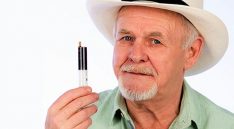
IS THERE ANY more tantalizing headline than “Scientists Discover a Cure for Cancer”? Some version of this fantastical claim has been dropped into the news cycle with the regularity of a super blood wolf moon for the better part of a century. In 1998, James Watson told The New York Times that a cancer cure would arrive by Y2K. This magazine hasn’t been immune either, running an “End of Cancer” headline a few years later. Each instance stirs up hope for patients and their families desperate to find a solution, no matter the risk or cost. And yet, here we are in 2019, with that constellation of complex, diverse diseases we lump together and call “cancer” for convenience’s sake still killing one in eight men and one in 11 women, according to the World Health Organization’s latest stats.
You’d think creators and consumers of news would have learned their lesson by now. But the latest version of the fake cancer cure story is even more flagrantly flawed than usual. The public’s cancer cure–shaped amnesia, and media outlets’ willingness to exploit it for clicks, are as bottomless as ever. Hope, it would seem, trumps history.
What’s Happening
On Monday, the Jerusalem Post, a centrist Israeli newspaper, published an online story profiling a small company called Accelerated Evolution Biotechnologies that has been working on a potential anti-cancer drug cocktail since 2000. It was somewhat cautiously headlined “A Cure for Cancer? Israeli Scientists Think They Found One” and relied almost entirely on an interview with the company’s board chair, Dan Aridor, one of just three individuals listed on AEBi’s website. In it, Aridor made a series of sweeping claims, including this eye-popper: “We believe we will offer in a year’s time a complete cure for cancer.”
It was an especially brash move considering the company has not conducted a single trial in humans or published an ounce of data from its completed studies of petri dish cells and rodents in cages. Under normal drug development proceedings, a pharmaceutical startup would submit such preclinical work to peer review to support any claims and use it to drum up funding for clinical testing. AEBi’s PR move might be an attempt at a shortcut. In an interview on Tuesday, the company’s founder and CEO, Ilan Morad, told the Times of Israel that lack of cash flow is the reason AEBi has elected not to publish data.
The original Jerusalem Post article did not interview any outside experts in the oncology field. Nor did it inject any skepticism about the gap between speculative, preclinical work in controlled laboratory environments and a universal cure on a 12-month timeline. Anyone who knows anything about oncology will tell you that a vast number of promising treatments fail human testing. One recent estimate put success rates for cancer drugs getting to market at a dismal 3.4 percent.
What People Are Saying
About 12 hours after the Jerusalem Post tweeted out a link to its story, figures from the far right began to amplify its optimistic headline. Pro-Trump twitter troll Jacob Wohl posted it, followed shortly by conservative political pundit Glenn Beck, who added his own self-aggrandizing touch. “As we have hoped and prayed, and I spoke about happening by 2030: A TOTAL cure for cancer.”






